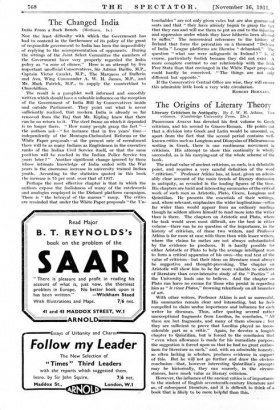The Origins of Literary Theory PROFESSOR ATKINS has devoted his
first volume to Greek criticism, and his second to Graeco-Roman. He points out that a division into Greek and Latin would be unsound, as, apart from the fact that the second period contains well- known critics such as Longinus and Dionysius of Halicarnassus writing in Greek, there is one continuous movement in criticism. His attempt to show this continuity is wholly successful, as is his carrying-out of the whole scheme of the book.
The actual value of ancient criticism, as such, is a debatable point, and requires a very careful definition of the word
criticism." Professor Atkins has, at least, given an admir- ably clear account of the main trends of literary discussion in antiquity, as revealed in the leading figures of the time. His chapters are lucid and interesting summaries of the critical work of such men as Aristotle, Plato, Cicero, Longinus and Quintilian. He presents the essentials of their writings, and, where relevant, emphasizes the wider implications—often far wider than would appear from an ordinary reading, though he seldom allows himself to read more into the writer than is there. The chapters on Aristotle and Plato, where the task would seem most difficult, are the best in either volume—there can be no question of the importance, in the history of criticism, of these two writers, and Professor Atkins is far more at ease with them than with lesser writers, where the claims he makes are not always substantiated by the evidence he produces. It is hardly possible for either Aristotle or Plato to help the average intelligent man to form a critical apparatus of his own—the real test of the value of criticism—but their ideas on literature must always be suggestive and thought-provoking. The chapter on Aristotle will show him to be far more valuable to students of literature than over-intensive study of the " Poetics " at the University leads one to believe. And the chapter on Plato can leave no excuse for those who persist in regarding him as " le vie= Platon," frowning relentlessly on all branches of art.
With other writers, Professor Atkins is not so successful. His summaries remain clear and interesting, but he feels compelled to claim undue 'importance and 'influence for each writer he discusses. Thus, after quoting several rather unexceptional fragments from Lucilius, he concludes, " All these are but fragments, and many of them obscure ; but they are sufficient to prove that Lucilius played no incon- siderable part as a critic." Again, he devotes a longish chapter to Quintilian, but is forced to the conclusion that " even when allowance is made for his immediate purpose, the suggestion is forced upon us that he had no great enthus- iasm for literature as such," and, with an admirable honesty, so often lacking in scholars, produces evidence in support of this. But he will not go further and draw the obvious conclusion—that, however interesting Quintilian'S precepts may be historically, they can scarcely, in the circum- stances, have much value as literary criticism.
However, the influence of the ancient critics is of importance to the student of English seventeenth-century literature and so, of subseqUent literature, and it is difficult to think of a book that is likely to be more helpful than this. '






































 Previous page
Previous page